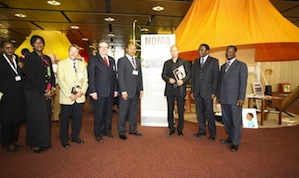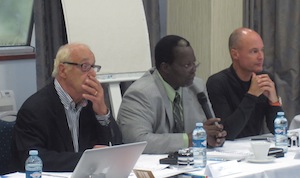Strategy


Advocacy at International Level
« Since Noma is a non communicable disease, it has no priority status. Since it is directly related to malnutrition and poor hygiene, it appears to be an unsolvable problem. Yet, Noma is a symbol: a symbol of the imbalance of a world split between a wasteful society and starving populations, between ultra-sophisticated technologies and total destitution. It is symbolic of our short-term vision when we forget that humanity will not be able to advance very far if it leaves three-quarters of its population behind. Ringing the alarm bell is not a naive act of solidarity - it is an effort to secure the future of humanity.» Bertrand Piccard
The campaigns of persuasion led by Bertrand Piccard and Brian Jones succeeded in giving more visibility to the problem of noma, not only in the countries concerned, but also in Swiss and international governmental bodies, as well as in the private sector.
The co-founders had opportunities to plead for the cause of noma with various influential personalities, and in particular the Director General of the World Health Organisation (WHO), the United Nations Secretary General, the Administrator of the UN Development Program (UNDP), the Director of the International Labor Organisation, the Swiss Foreign Minister and the Swiss Minister for Economic Affairs.
The field trips carried out by the two Co-founders and later by the Director resulted in the creation of strong links with the authorities in the countries affected by noma, including at the highest levels. They were able to meet with Presidents as well as several Prime Ministers and Health Ministers. Many of these authorities had never before heard anyone mention this disease until the noma programs were launched in their countries.
In a similar way their participation in international conferences such as the UN World Summit on Social Development (2000), the Crans-Montana Forum (2000), the World Economic Forum in Davos (between 2000 and 2006), the International Oral Health Forum organized by the International Dental Federation (FDI) in Kenya in 2004, and the International North-South Media Festivals of 2004 et 2006, all helped to keep the question of noma in the forefront on the international stage and to publicize and explain the work of the Foundation. The role of Bertrand Piccard as United Nations (UNFPA) Goodwill Ambassador also contributed greatly to advancing the Foundation’s advocacy mission.
The Co-founders and the Director also take the opportunities offered by the lectures, seminars and public appearances which they give either privately or for Winds of Hope (especially in companies), to raise the question of noma in general, and describe the activities of the Foundation in particular. In this way they have been able directly to reach several hundred thousand people in financial, economic, political and medical circles.

Mobilizing International Action
The fight against noma is a gateway that leads to the most underprivileged people on earth: let's open the gates!
Apart from the practical activities carried out in the field, Bertrand Piccard and Brian Jones use their celebrity status to mobilize international action against noma. As a United Nations Goodwill Ambassador Bertrand Piccard involves himself in programs to combat poverty and uses his lectures and meetings with politicians to inform people about the existence of this dreadful disease and to raise funds for fighting noma in the field.
Within this framework, Winds of Hope is taking action aimed at:
• Raising awareness of noma in the general public, governing authorities, the private sector and the international community;
• Pleading for the elimination of noma;
• Bringing together all the organisations engaged in the fight against noma.
By informing the media of the existence and nature of noma, Winds of Hope aims to induce the political authorities to realize how urgent it is to take action, and to appeal to public opinion and companies for help in financing campaigns to combat this scourge.
Some companies have associated themselves with the foundation’s efforts, themselves organizing campaigns to make this disease better known and to raise funds. Given the enormous needs of all the affected countries, the leveraging effect of the campaign must be strengthened so as to mobilize more people and raise enough money for a global campaign.







